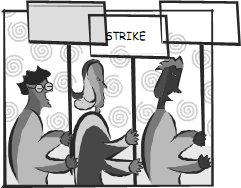
Collective agreements describe in a legal contract the way in which a company treats and manages its employees. This process is at times loud and angry.

Does this picture look familiar? Have you seen picket lines outside of buildings? When talks break down between union representatives and management, there is sometimes a strike or workers are locked out. Sometimes strikes last a very long time and sometimes things get settled quickly. Workers do not like to go on strike but they say that sometimes they have to.
All sectors have unions but not all companies in a sector are unionized. The public service (government) has unions. Teachers and professors are unionized as are nurses and other caregivers. They may even share the same unions.
When you start a new job in a union environment it is important to read your collective agreement and to find out the name of your union steward. The language used in collective agreements is legal language and sometimes difficult to understand. There are words used within unions that are common to all.
Using pages 117 and 118, work with a partner and match a word or words with a meaning. Compare your answers with others. Could you guesstimate? Were you able to guess the meaning from the context?
| Word | Meaning |
|---|---|
| affiliated union | Production and maintenance workers not office or professional personnel |
| collective agreement | Payments by union members |
| arbitration | These are non-wage benefits like paid vacations, pensions etc. The employer pays all or part of the cost. |
| bargaining agent | Temporary, long or final separation from employment. There is no work. |
| blue collar workers | A union that is a member of a group of unions |
| collective bargaining | When union and management cannot reach an agreement, a third party intervenes. Their decision is legal and binding |
| dues | This may be added to a collective agreement. It protects a worker’s job in some situations. E.g., new methods or machines |
| fringe benefits | A contract between one or more unions and one or more employers. It usually covers things like wages, hours, working conditions |
| grievance | Method of determining wages etc. The result is a written agreement or contract |
| job classifications | The union named by a labour relations board for the purpose of collective bargaining |
| job security | Complaint against management by one or more employees |
| layoffs | Jobs are rated based on the requirements of the work |